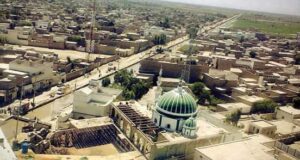Quetta, once known for its beauty, clean air and healthfulness, has degenerated into a marshland of problems. Population of this city has exponentially grown through natural and doubtful naturalisation processes but without any proper corresponding planning to meet the needs of the population. Hence, the entire city has turned into a large slum, with sights of litter dumps, filth and flowing gutters every few steps. Among many other problems of different sort, one of the alarming problems that this city is facing is the issue of non-biodegradable material that are prolifically used and dumped at every nook and cranny of the city. Consequent upon this unscrupulous use of plastic bags, with the Environmental Protection Agency (EPA) and other authorities least concerned, Quetta has finally turned into a highly unhealthy place to live in.
Polythene bags and other plastic produced material that are used in Quetta without any restriction are actually non-biodegradable. Such material cannot be broken down by the natural process once produced and increase environmental risks for a city that already has many other unfortunate sources of toxification of its air, ground and surface water. The Sustainable Development Goals (SDGs), adopted by UN, call for sustainable cities and communities which become supportive of not only the current generations but also the generations to come. But it seems that neither the masses nor the authorities exhibit any care in maintaining the city and its atmosphere clean.
Due to their extremely slow break down process, which perhaps takes centuries, the plastic bags have been responsible for suffocation deaths of woodland animals as well as inhibiting soil nutrients. They have also become the greatest threat for the marine life in different parts of the world. Besides, use of polythene bags has many other health hazards for humans such when on heating and melting, they emit toxic chemicals in the air and pollute it, becoming cause of many lungs ailments.
Quetta Municipal Corporation (QMC) has already been seen of lamenting of limited resources in disposing off the garbage of the city produced on daily basis. Many a times the sitting Mayor Quetta, on record, admitted that the human and physical resources were insufficient for with the city government and therefore, the heaps of garbage are burnt down on their places. This strategy of burning of the garbage on place has made the quality of air in Quetta one of the most toxic ones. Allowing around 30,000 rickshaws without any prior study and their impact on environment, the government not only added to the traffic problems of this city but it also added to the pollutants of the air in Quetta which have negative impacts on human activities. This emission of toxic gases by burning garbage and fossil fuel by vehicles is resulting in increase of methane, nitrogen oxide, lead and several other dust and gaseous particles, many studies confirm.
Hence at risk are the citizens of Quetta. It is, therefore, the need of the hour that government took an immediate notice of the air and soil pollutants spread in form of non-biodegradable material and took actions to control it. The use of non-biodegradable material was banned previously more than twice but to no avail as at stake were interests of large interest groups. Government should, therefore, announce some compensatory allowances and alternative plans for the losses of the traders and ban the use of non-biodegradable material once and for all. Similarly, the QMC should be disallowed to burn the garbage on place and devise healthy plans of disposing off the litter produced in the city. EPA should play a proactive role in this regard to ensure no Environmental Laws are broken on the pretext of insufficient resources at the cost of the general masses health. Finally, media campaigns and sensitisation of the general masses regarding the health and environmental hazards of the non-biodegradable waste is essential through regular and social media to say no to the use of polythene bags.
Publish in The Balochistan Point on August 7, 2017
 Balochistan Point Voice of Nation
Balochistan Point Voice of Nation




